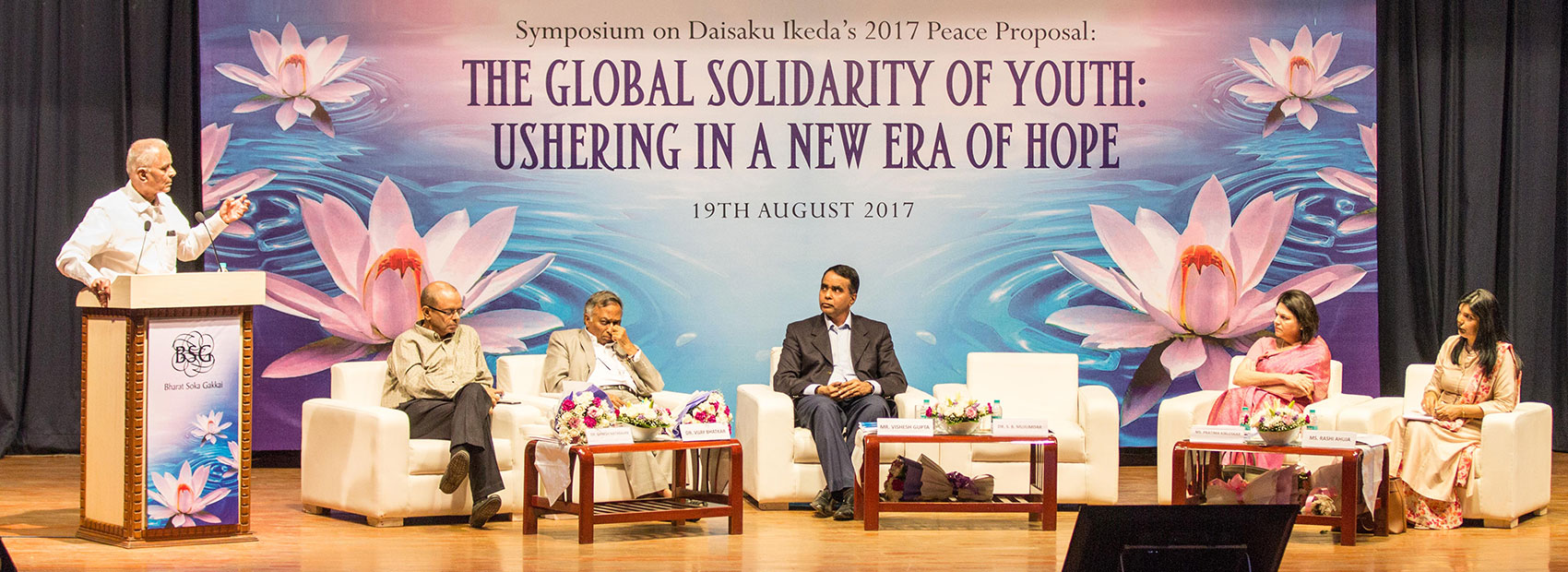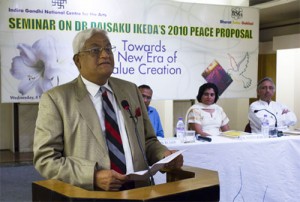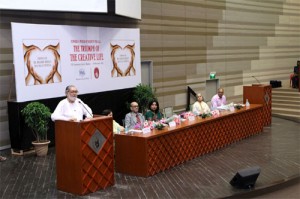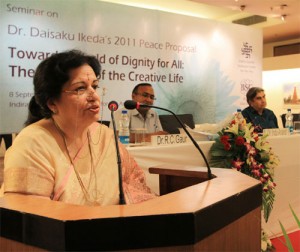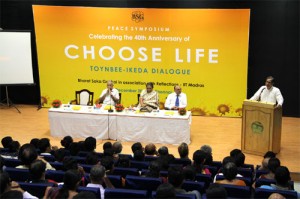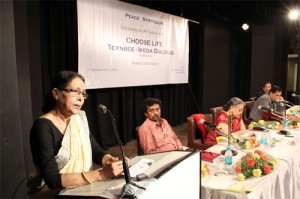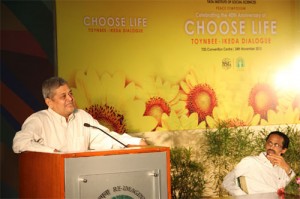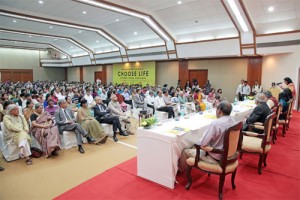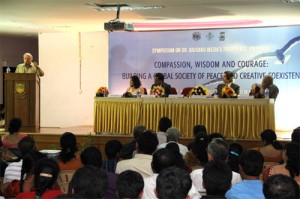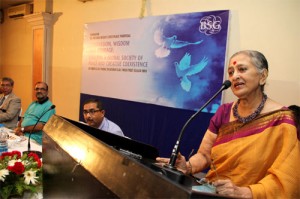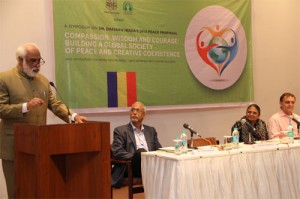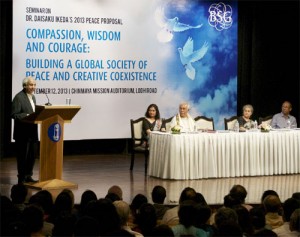September 9, 2014
Chinmaya Mission, New Delhi
BSG organised a symposium on SGI President Ikeda’s Peace Proposal on 9 September 2014 at the Chinmaya Mission auditorium in New Delhi. The annual symposium commemorates 8 September 1957, the day second Soka Gakkai president Josei Toda called upon the whole world to abolish nuclear weapons. This declaration, made when the Cold War was at its peak, marks the beginning of the Soka Gakkai’s peace movement.
The audience of 300 people, including intellectuals, professionals and educationists, listened with keen interest to the thoughts on the peace proposal, Value Creation for Global Change: Building Resilient and Sustainable Societies, of three distinguished panellists: Mr. K.C. Singh, former ambassador to the UAE and Iran, who gave the keynote address; Mr. Siddharth Varadarajan, a Senior Fellow at the Centre for Public Affairs and Critical Theory, Shiv Nadar University, and former editor of The Hindu; and Prof. Farida Abdullah Khan, member of the National Commission for Minorities and professor of Educational Studies at Jamia Millia Islamia in Delhi.
The event opened with a short film made by the BSG, SGI President Ikeda: Peace Proposal 2014, featuring eminent friends of the SGI, including world-renowned Lotus Sutra scholar Lokesh Chandra and lawyer and activist Tripti Tandon. The film shows how the SGI has been encouraging people to “regard their immediate surroundings as the arena for fulfilling their mission, even when beset by great difficulties, and to aspire to create personal narratives that will be a source of enduring hope. This is the way of living, the way of perceiving life, that Nichiren taught his followers.”
Welcoming the guests, Mr. Vishesh Gupta, BSG chairperson, said: “As you saw in the film, the Japanese word soka means value creation, and in this peace proposal SGI President Ikeda highlights how opening up the inner capacities of our lives can bring forth the limitless possibilities of each individual. . . .
“The examples cited by President Ikeda of Malala Yousafzai, Nelson Mandela, Viktor Frankl, King Ashoka and others in the peace proposal are testimony to the fact that when one single individual feels empowered to create hope, brings forth his inner goodness, and works together in solidarity with others for a larger altruistic goal, then he or she can create value that has ripple effects in the society empowering many others in the process.
“In the 2014 peace proposal, President Ikeda has made three specific proposals which are critical to the effort to create a sustainable global society in which the dignity of each person shines. The first relates to education which is the key source of empowerment that enables people to take up this challenge. The second is to establish regional cooperative mechanisms to reduce damage from extreme weather and disasters and promote peaceful solutions. The third is the prohibition and abolition of nuclear weapons.”
These also were the themes taken up by the three panellists. Prof. Khan spoke on education, Mr. Varadarajan on regional cooperation and nuclear weapons, and Mr. Singh focused on the worldwide unrest and violence, and the need for peace.
Rousing the audience to ponder on a critical issue of the day, Prof. Khan reflected on education in the context of the violence and conflict experienced by children. In her thoughtful, ruminative way, she asked the audience: “Does education have any potential for creating a better world? And are inherently unequal societies capable of creating systems of education that encourage social justice and equality and promote truly democratic systems?”
Prof. Khan said that children won’t understand how to deal with violence if we gloss over what is happening around them. She said: “We must think how education can be an instrument of peace. I have worked in the field of education and in a lot of remote areas with children who try to acquire an education under extremely difficult circumstances, children who want to be educated but do not have the opportunity to do that. I have also, in my recent appointment in the Minorities Commission, been looking at children in conflict-ridden areas who want an education. I have also done research on education in Kashmir, in areas where there has been conflict for a long time. . . .
“There are actually 28 million children living in areas of conflicts. These conflicts not only take children away from school but also leave scars of violence which are very difficult to heal in future. In situations of conflicts, schools also become a haven away from conflict. The larger question is, what do students learn about conflicts in schools? Do they understand in more profound and deeper ways what is wrong in the world and how to create a better world?
“I am talking specifically of the Indian school system. We introduce the differences [of enormous social disparity and economic disparity] existing in the country, but we do not allow children to look at how these differences create conflicts and what are the things we need to do to resolve these conflicts. Children have a much deeper capacity for analysis than adults realise. I have been in classrooms where there have been debates on issues of oppression, exploitation. Children as young as class 4 and 6 have been able to enter those debates and bring out situations.”
Mr. Varadarajan said he was responding to President Ikeda’s Peace Proposal “as a journalist, as a lay person” and sharing his thoughts on how we might benefit from it in India.
He said: “What I liked is the manner in which this proposal is phrased or framed. It starts with something that is really a goal or a target that is achievable at the local level, at the national level. . . .”
“When we talk of regional cooperation—the phrase SGI President Ikeda uses is resilience, essentially, looking at disaster management—there couldn’t be a more apt time for people in India and Pakistan to talk about this. We have a devastating flood that has ruined the lives of thousands of people in Jammu and Kashmir on both sides of the border. This underlines like nothing else what 60 years of politicking and bickering and fighting have failed to do—that India and Pakistan and the people of Kashmir have a shared destiny that requires countries and people to work together to resolve their differences. . . .
“It is essential that India, China, Bangladesh and Nepal find ways to cooperate with each other, looking at all water resources-related issues so that timely intervention can prevent such disasters. This is an area where unfortunately South Asia lags behind other parts of the world. . . .
“I applaud the specific suggestions that SGI President Ikeda has made, the first one being that there should be an agreement among nuclear weapons states on the non-use of nuclear weapons. . . . A useful stepping stone towards the goal of non-use is for all nuclear weapons states to agree to a treaty on no-first-use, which means you are pledging never to be the first to use these weapons. India, for example, is committed to never be the first to initiate the use of nuclear weapons. We have to address the root cause of the desire to acquire nuclear weapons.”
Mr. Singh said in his keynote address that he felt a deep resonance with SGI President Ikeda’s concern over the unrest in the world. “With turmoil in West Asia, the rise of new radical religious forces, the stand-off in the Ukraine and tensions in the East and South China Seas, the challenge to global peace is even graver today.”
In his lively talk, leavened with laughter, Mr. Singh asked, “Is peace a state of international nirvana where every one of the seven billion citizens of this world attain nirvana? . . . That’s never going to be possible. Is it peace when everybody is in complete harmony with the family, with people at the workplace, with everybody on the street? That’s not going to be possible. So what is peace? Is peace a state of stability, as in a city where there is no crime? Globally, what is peace? . . .
“We are exactly 100 years from the start of the First World War, which started a cycle which has still not finished. In 1914 Germany was the rising star, and there were the old powers. When powers are rising, a contest begins. That is exactly what happened in 1914. . . .
“We have instability in the world when we are transiting to a new world order. Power is transferring from the West to Asia. China and India are getting back to where we were at the beginning of the 19th century when 50 percent of the global production was with India and China. As the power shift takes place both from West to East, and within Asia itself, the redistribution of political and economic power will be resisted. [. . .] What SGI President Ikeda is saying is that we must make sure that the children in each of these countries are morally and spiritually enriched so that they can judge for themselves whether what their leadership is doing is correct.”
In her closing address, Ms. Reddi said: “SGI President Ikeda says that each individual’s efforts at inner transformation, or human revolution, will steer the world towards peace. The times are clearly moving in the direction of an age of the people. However, the negative tendency to regard people as the means to an end and trample on their humanity and dignity still continues unabated. That is precisely why, at this critical crossroads, fostering individuals of unwavering conviction is so vital. For, it is individuals who will open the way to creating this age of the people. At a crucial moment it is the strength and courage of ordinary people who have no name or position in society that save the day. The famous, the well-connected, almost always have too much to lose, and they abandon the cause in order to protect themselves.
“I would like to end with a quote from the noted pacifist scholar Johan Galtung: ‘We must be realists in our brains while keeping the flame of idealism burning in our hearts.’ Both of these—to see the world as it is and how it could be—are essential to reform.”
The volume of the collected peace proposals of President Ikeda, A Forum for Peace, was released at the symposium. This substantial volume is a collection of excerpts from the most topical and important of President Ikeda’s peace proposals which he has been submitting to the UN since 1983.
Mr. Gupta gave Prof. Khan, Mr. Varadarajan and Mr. Singh crystal mementos with an image of the Hall of the Great Vow for Kosen-rufu and this legend: ‘On the Occasion of Seminar on SGI President Daisaku Ikeda’s Peace Proposal: “Value Creation for Global Change: Building Resilient and Sustainable Societies” – 2014. Bharat Soka Gakkai’.
Guests mingled with each other at the high tea following the seminar. DLF Public School principal Seema Jerath said, “It’s absolutely true that if the world has to change, man has to change, and for man to change, he or she must want to change. The peace proposal, and the very concept of the BSG, will definitely change the world.”
Prof. Vijay Aggarwal from New Delhi, said he was very happy at having had the opportunity to be at the symposium.
Many of the guests were similarly delighted to have attended the symposium.
Mr. M.N. Krishnamani, senior advocate and former president of the Supreme Court Bar Association, said, “The seminar was excellent. I enjoyed it.”
Retired bureaucrats P.C. Sen and Binoo Sen both enjoyed the short film screened at the beginning. They are very interested in the Daishonin’s Buddhism and have read some of SGI President Ikeda’s books. Mr. P.C. Sen said, “The event was superbly organised and the volunteers combined amazing discipline with love,” and rounded off the evening with the declaration: “SGI President Ikeda is a Gandhi in a non-Gandhian age.”
